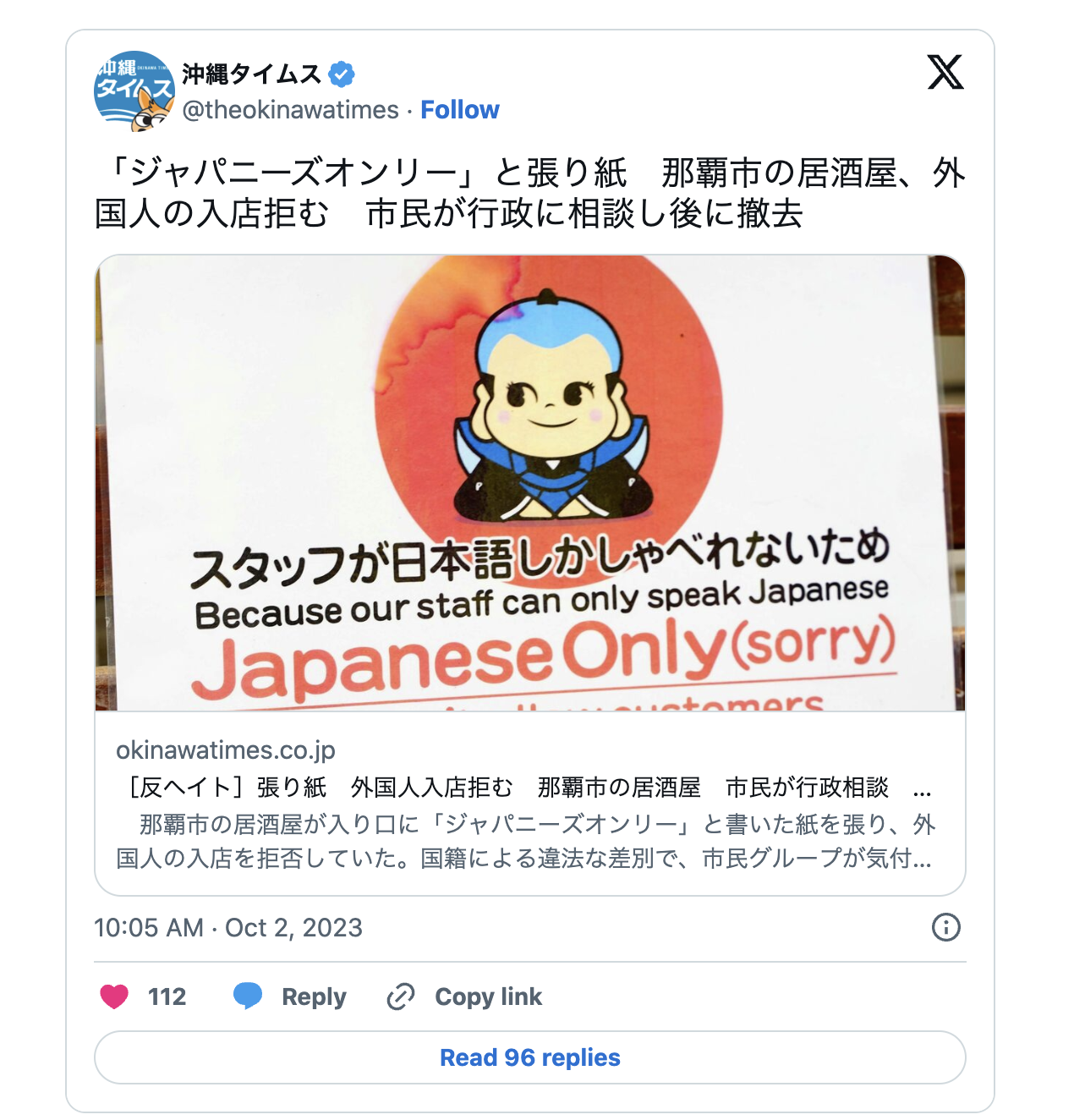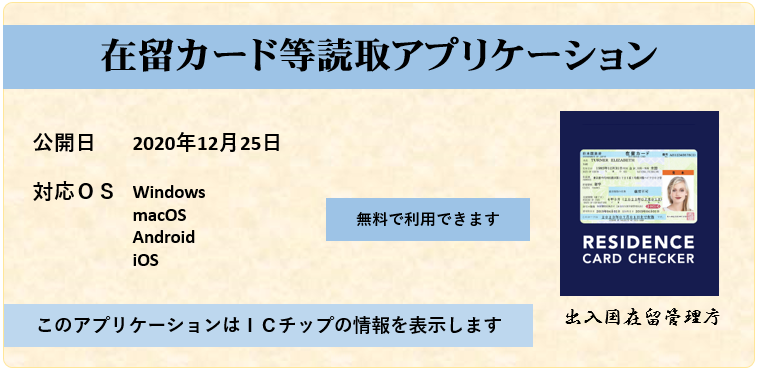mytest
Books, eBooks, and more from Debito Arudou, Ph.D. (click on icon):





![]()


UPDATES ON TWITTER: arudoudebito
DEBITO.ORG PODCASTS on iTunes, subscribe free
“LIKE” US on Facebook at http://www.facebook.com/debitoorg
https://www.facebook.com/embeddedrcsmJapan
http://www.facebook.com/handbookimmigrants
https://www.facebook.com/JapaneseOnlyTheBook
https://www.facebook.com/BookInAppropriate
If you like what you read and discuss on Debito.org, please consider helping us stop hackers and defray maintenance costs with a little donation via my webhoster:

All donations go towards website costs only. Thanks for your support!
(Original title of this blog post was, “Mainichi and Asahi: 40% of Japan’s local govts received coordinated complaints from Far-Right Internet Trolls nationwide, stymieing local-govt policies to help their NJ Residents. Hence being the “Good Gaijin” will not help you assimilate in this political climate.” But that was a bit misleading, so amended; H/T to SB.)
Hi Blog. I post these two articles because they offer evidence that becoming a part of Japanese society isn’t just a matter of being “Good Gaijin”, e.g., contributing and behaving until “your outward appearance causes no particular problems“. These are good things to do, of course, but they are not a panacea, because the Netto Uyoku (Far-Right Internet Xenophobes and Trolls) in Japan are well-organized and will not accept NJ as Residents under any circumstances.
There is in fact a long history of the Netto Uyoku and helpful local government policies shot down one after another due to a storm of “complaints” like these (many of which aren’t even from local residents; see the Asahi article below the Mainichi in Japanese), as seen in this case study from 2013 about Tottori Prefecture passed, then UN-PASSED, a human rights ordinance. This is how the structural barriers to NJ Residents remain, and will not be removed until governments stand up to racists and trolls like these. Debito Arudou, Ph.D.
/////////////////////////////////////////////
40% of Japan local gov’ts received complaints over foreigner policies: Mainichi survey
December 19, 2025 (Mainichi Japan), courtesy of Mark Schreiber
Courtesy https://mainichi.jp/english/articles/20251219/p2a/00m/0na/010000c
Japanese version below
Photo: People raise signs opposing immigrants during a rally in Tokyo’s Shinjuku Ward on Nov. 30, 2025. (Mainichi)
FUKUOKA — There has been a spate of cases where local governments in Japan have been flooded with complaints over measures related to foreigners.
A Mainichi Shimbun survey covering 67 local bodies — 47 prefectural governments and 20 ordinance-designated cities — found that 40%, or 26 of 65 bodies responding to the survey, had instances of complaints, protests and opinions streaming in regarding foreigner policies over the past year. [emphasis added]
The survey specifically asked whether there were cases where complaints and other opinions were frequent, what triggered them and the number of those cases over a one-year period up to the end of September 2025. A total of 65 local governments, excluding the Tokyo Metropolitan Government and the Nara Prefectural Government, replied, with the response rate at 97%.
Of the 26 local bodies that reported experiencing a series of complaints, 15 received fewer than 100 calls or emails across 18 cases, 13 received 100 to fewer than 1,000 calls or emails across 18 cases, and three received 1,000 or more calls or emails across three cases.
The most significant case involved Miyagi Prefecture’s temporary consideration of developing burial grounds with Muslim residents in mind, which drew 2,470 calls and emails including those expressing concerns about the potential impact on water quality and soil.
Several local governments indicated that complaints were driven by unverified or false information on social media.
Of the 26 governments, 19 reported feeling burdened by handling complaints, with Miyagi Prefecture noting instances requiring 1 1/2 to 2 hours to respond and Shizuoka Prefecture revealing that staff were subjected to verbal abuse, causing them to feel scared of answering calls.
While most governments said there was no impact on their policies from a rush of baseless complaints, Shizuoka Prefecture noted increased caution in sending out information on multicultural coexistence policies to avoid complaints. Nara Prefecture, while admitting there were cases where complaints, protests and opinions flooded in, refrained from responding to the survey due to concerns about similar incidents arising from media coverage.
Among the 26 governments, more than 90%, or 24 local bodies, reported an increase in complaints compared to the previous year. As for the reasons, they cited a surge in foreign residents and extensive discussions on foreign nationals during the House of Councillors election in July.
Masami Wakayama, a professor of political science at Hokuriku Gakuin University, pointed out, “The concentration of burdens on local governments may cause them to feel intimidated, potentially reversing the trend toward multicultural coexistence.” He stated, “The current Liberal Democratic Party-led administration is extremely wary of introducing measures as ‘immigration policy’ due to concerns about alienating conservative voters. However, adapting to changing times and society is essential. As demands from residents to local governments increase, there is a growing need to enhance support systems for local bodies, including the development of laws to serve as a basis for their decision-making.”
(Japanese original by Keisuke Muneoka and Mayuka Ikeda, Kyushu News Department)
/////////////////////////////////////////////
外国人施策などへの苦情、自治体の4割に 「電話怖くなった」職員も
社会
毎日新聞 2025/12/19 07:00(最終更新 12/19 07:49)
https://mainichi.jp/articles/20251217/k00/00m/040/345000c
フォート:移民に反対するプラカードを掲げる人たち=東京都新宿区で2025年11月30日午後2時45分
外国人に関わる施策などを巡り、自治体に苦情が殺到するケースが相次いでいる。毎日新聞が過去1年間に苦情や抗議、意見が相次いだ事例の有無について都道府県と政令市の計67自治体に取材したところ、回答した65自治体のうち4割にあたる26自治体が「あった」と答えた。
2025年9月末までの1年間で、苦情が相次いだ事例の有無やきっかけ、件数などを聞き、東京都と奈良県を除く65自治体が回答した(回答率97%)。
苦情などが相次いだ経験があったと答えた26自治体に寄せられた電話やメールの件数は、100件未満が15自治体18事例▽100件以上1000件未満が13自治体18事例▽1000件以上が3自治体3事例――だった。
最も多かったのは、宮城県が整備を一時検討していた、イスラム教徒らの利用を念頭に置いた土葬墓地に関する事例で、「水質や土壌への影響が不安」などといった電話やメールが2470件程度寄せられた。
在留外国人数の推移
26自治体中19自治体が苦情対応の負担が「あった」と回答。「1時間半から2時間に及ぶ対応を迫られる事例が複数」(宮城県)「(職員が)一方的に暴言を受け、電話に出るのが怖くなった」(静岡県)と明かした。
多くの自治体が根拠のない苦情が殺到することによる施策への影響は「なかった」と回答したが、静岡県は「多文化共生施策に関する情報発信で、苦情を受けないよう配慮をするようになった」と答えた。奈良県は「苦情や抗議、意見が相次いだ事例はあったが、記事で同様の事案が発生することを懸念」と回答を控えた。
苦情が相次いだ26自治体のうち、前年に比べ苦情が「増えた」と答えたのは9割超の24自治体。在留外国人が急増していることや、7月の参院選で外国人に関する議論が多く交わされたことを理由に挙げた。
北陸学院大の若山将実教授(政治学)は「自治体に負担が集中することで萎縮し多文化共生の流れが後退する恐れもある」と指摘。「現在の自民党中心政権では保守層を意識し『移民政策』として施策を打ち出すことを極度に恐れる側面があるが、時代と社会の変化への対応は不可欠だ。住民からの自治体への要望が増えるなか、判断のよりどころとなる法律の整備など自治体の支援体制の拡充が一層求められる」と話す。【宗岡敬介、池田真由香】
==================================
Miyagi halts Muslim burial site plan amid pushback
THE ASAHI SHIMBUN
September 19, 2025 at 18:49 JST, courtesy of Niklas
https://www.asahi.com/ajw/articles/16039254
SENDAI—Miyagi Governor Yoshihiro Murai abruptly scrapped a plan to build burial sites for Muslims on Sept. 18, citing unanimous oppositiion from local mayors–just weeks ahead of the gubernatorial election.
His announcement came during a general session of the prefectural assemby that day, when Murai responded to a question from a member who asked, “Wouldn’t it be appropriate to cancel the plan to avoid further confusion, given the lack of support?”
The proposal, which had been under consideration since late last year, sought to accommodate religious burial practices for foreign workers—but faced strong public opposition and political resistance.
Murai revealed that between Sept. 13 and 17, he had called every mayor in the prefecture to confirm their position.
“All of them said they could not accept the plan, even if the prefecture formally proposed it,” he said.
Under Japan’s cemetery and burial law and prefectural ordinances, new cemeteries require approval from local municipalities.
With no prospect of gaining consent from mayors—the final decision-makers—Murai said, “The situation is extremely difficult, and I have decided to withdraw the plan entirely.”
Just days earlier, on Sept. 12, the governor had responded to a similar question by saying the plan was still in the research phase and undecided. However, that exchange prompted him to seek clarity from local leaders, he said.
Speaking to reporters after the withdrawal announcement, Murai said, “I’ve been struggling with this for quite some time. I concluded that continuing the discussion would only increase anxiety among residents.”
ORIGINS OF THE PLAN
The idea to build burial sites for Muslims emerged as part of Miyagi Prefecture’s efforts to attract foreign workers, particularly from Islamic countries such as Indonesia.
Due to religious beliefs, Muslims cannot be cremated, but Japan has only about 10 cemeteries nationwide that allow burials.
In 2023, the prefectural government signed a memorandum with the Indonesian government to accept more technical interns and skilled workers.
Anticipating a rise in long-term residents, Murai had identified the need to “create a supportive living environment,” including burial options, as a key policy goal.
In October last year, Murai told the prefectural assembly that he wanted to explore building burial sites for Muslims and others who, for religious reasons, do not wish to be cremated. Prefectural staff began visiting existing burial sites outside the prefecture to gather information.
Although Japan does not legally prohibit burials, many municipalities effectively ban them through local ordinances.
In Miyagi, Muslim residents had previously consulted municipal governments about building burial sites, but conditions such as “no impact on the surrounding environment” and “consent from nearby residents” proved difficult to meet.
As a result, families often had to transport bodies to distant burial sites or repatriate them to their home countries.
PUBLIC BACKLASH
When media reported in late December that Murai was considering building burial sites, the prefectural office was flooded with calls and emails expressing concern and opposition.
Comments included, “Is this going to move forward without public input?” “I’m worried about damage to the reputation of local products and environmental impact,” and “I’m uneasy about the increase in foreign residents.”
The prefecture has received more than 2,000 emails and phone calls to date. Approximately half of these reportedly came from outside the prefecture. [emphasis added]
Despite the backlash, Murai initially stood firm. He said the plan was based on requests from Muslim residents and argued, “If we talk about multicultural coexistence, but ignore (burial) needs, that’s a failure of governance. Even if criticized, we must move forward.”
In March, Murai condemned discriminatory social media posts targeting Muslims and reiterated his commitment to the burial site plan.
“Japan originally had a burial culture. Christianity is also based on burial. Even the imperial family used to be buried,” he said.
He emphasized that the issue affected not only foreign residents but also Japanese converts to Islam.
Murai also downplayed environmental concerns: “Wild animals return to the soil naturally. Saying burial causes pollution is an exaggeration.”
Acknowledging the negative reactions, he said, “I’ve received online pushback, but I believe this is necessary.”
ELECTION PRESSURE
The sudden reversal has sparked speculation that Murai’s decision was politically motivated. He is currently serving his fifth term and plans to run for a sixth. Official campaigning will kick off on Oct. 9 and voting is scheduled for Oct. 26.
While the burial site plan was never part of his official campaign platform, some candidates voiced opposition, saying it could lead to increased immigration and should not be led by the prefecture.
Even within the Liberal Democratic Party faction supporting Murai in the gubernatorial election, many members expressed negative views toward the plan.
Murai insisted, “I didn’t withdraw the plan because of the election.”
However, opposition lawmakers say the timing suggests a political calculation.
“He probably realized he couldn’t go into the election with this controversy swirling,” said an opposition assembly member. “Murai isn’t the type to give up after a single phone call. He may have been looking for the right moment to pull back.
COMMUNITY REACTION
“It made me happy that (the prefecture) didn’t just see foreigners as laborers, but actually considered their lives,” said Noboru Sato, 83, a Muslim and representative of the Islamic Cultural Center of Sendai (ICCS). “That’s why this is so disappointing.”
According to Sato, who has led the organization for nearly four decades, the Muslim populations in the prefecture–once made up primarily of international students–now includes workers in the automotive and construction industries, reflecting both steady growth and increasing diversity.
There are only about 10 burial cemeteries in Japan, and none in the Tohoku region. Sato said that many Muslims wish to be buried in their hometowns, but currently must travel to the Kanto or Chubu regions, which is costly and complicated.
Sato and other Muslims had written letters to the governor requesting burial sites.
“Many people aren’t familiar with Muslim culture. Forcing the plan through amid so much criticism wouldn’t be right. I suppose it can’t be helped,” Sato said.
Muhammad Usama, 29, a Pakistani staff member at ICCS, said he understands that the Islamic burial rules may appear to Japanese as a “unique culture.“
At the same time, he added, “Day by day, Japanese people accept Islam” and “understand our religion.”
Sato agreed, saying, “We must continue working to eliminate misunderstandings and prejudice.”
(This article was compiled from reports by Ryo Oyama, Ikuko Abe and Yosuke Fukudome.)
Related News
Miyagi to secure cemetery to put workers from Indonesia at ease
December 22, 2024
Muslims living in Japan face difficulties burying the dead
May 11, 2022
ENDS
======================
Do you like what you read on Debito.org? Want to help keep the archive active and support Debito.org’s activities? Please consider donating a little something. More details here. Or if you prefer something less complicated, just click on an advertisement below.



























 \
\






































































